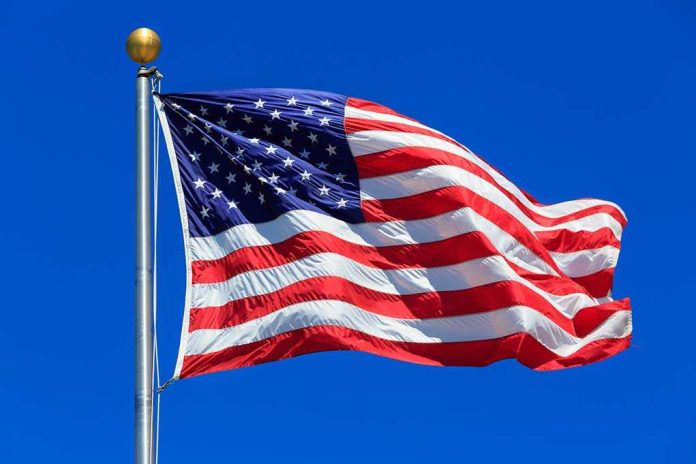
President Trump’s new executive order puts Americans on notice: flag burning will now come with prosecution and jail time, reigniting debate over free speech and patriotism.
Story Snapshot
- The Trump administration directs federal agencies to prosecute individuals who desecrate the American flag, including flag burning.
- The order challenges Supreme Court precedent protecting flag burning as free speech, sparking legal and constitutional debate.
- Non-citizens involved in flag desecration may face immigration consequences, expanding enforcement reach.
- Recent increases in flag burning incidents, especially during protests, prompted the new directive.
Trump’s Executive Order: Prosecution of Flag Burning
On August 25, 2025, President Donald J. Trump signed an executive order requiring federal agencies to prioritize prosecuting those who desecrate the American flag. The directive mandates the Attorney General to refer cases to state and local authorities when appropriate, and to pursue immigration consequences for non-citizens who participate in flag desecration. This action follows months of intensified flag burning during protests, particularly those related to anti-Israel demonstrations and political unrest. The order frames the move as necessary to restore respect for the flag and national unity, while directly challenging the scope of Supreme Court rulings that have historically protected flag burning as a form of free speech.
The Trump administration’s stance appeals to many conservative Americans who have grown frustrated with the perceived erosion of traditional values. For decades, the American flag has symbolized unity, sacrifice, and national pride. Acts of flag burning—once rare—have become more common in recent years, frequently appearing in campus protests and political demonstrations. Although the Supreme Court, in *Texas v. Johnson* (1989), affirmed that flag burning is protected symbolic speech under the First Amendment, calls to criminalize such acts have persisted. The executive order marks a direct challenge to this precedent, signaling a willingness to confront the courts and redefine the limits of constitutional protections.
Federal Enforcement and Legal Challenges
Federal agencies, led by the Department of Justice, are now tasked with reviewing existing laws to find avenues for prosecution. The order specifically directs law enforcement to treat flag desecration as a priority, with a focus on cases that can be referred to state and local jurisdictions. For non-citizens, the Department of Homeland Security and the State Department have been instructed to pursue immigration-related consequences, potentially leading to deportation or visa denial. Despite these directives, legal scholars widely agree that the Supreme Court’s protection of flag burning presents a formidable obstacle. Previous attempts to pass federal flag protection laws have been struck down, and any new prosecutions are expected to trigger swift constitutional challenges.
President Trump has been clear in his intent, stating, “If you burn a flag, you get one year in jail, no early exits, no nothing.” Administration officials emphasize their goal to expand prosecutable offenses related to flag desecration, though the boundaries remain tightly constrained by the First Amendment. Critics, including civil liberties organizations, argue the order threatens free speech and risks government overreach, warning of the dangerous precedent set by criminalizing symbolic acts of dissent. Supporters counter that protecting the flag is vital for national security and public order, viewing the executive order as a necessary step to deter hostile or disrespectful acts.
Immigration Consequences for Flag Desecration
The executive order’s reach extends beyond U.S. citizens, targeting non-citizens who participate in flag desecration. Under the new directive, individuals found guilty of burning or otherwise desecrating the flag may face deportation, visa revocation, or denial of entry. This measure aligns with the administration’s broader immigration policies, which have emphasized stricter enforcement and expanded cooperation between federal and local authorities. Recent legislation such as the “One Big Beautiful Bill Act” and the Laken Riley Act reflect the administration’s ongoing efforts to toughen immigration laws and punish those who violate national symbols or security. These provisions have already led to increased scrutiny, expanded detention budgets, and harsher penalties for immigrants accused of criminal acts.
“President Trump signed an Executive Order on Aug 25, 2025, titled ‘Prosecuting Burning of the American Flag.’ It prioritizes enforcement of laws against flag desecration that incites violence or violates civil rights, consistent with the First Amendment. Full text:…
— KJ (@Ivyleague788) August 26, 2025
Legal experts caution that linking flag desecration to immigration consequences may invite further challenges, especially if the acts in question are protected under the Constitution. Nonetheless, the administration’s posture signals a willingness to test these limits and assert federal authority, regardless of potential litigation. For conservative Americans, the move resonates as a restoration of patriotic values and an assertion of national sovereignty against protest-driven attacks on tradition. Detractors maintain that such policies risk deepening social divides and undermining core constitutional rights, underscoring the ongoing struggle between government authority and individual liberty.
Sources:
Fact Sheet: President Donald J. Trump Protects the American Flag from Desecration
Trump flag burning executive order (Axios)
Trump Burning American Flag Supreme Court (TIME)
Trump Crack Down Flag Burning Desecration Executive Order (Fox News)
Prosecuting Burning of The American Flag (White House Presidential Actions)



